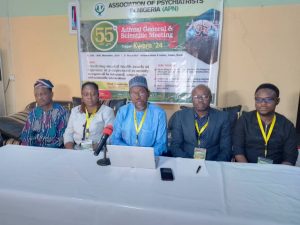Mental Health: APN advocates grief-counselling support for Nigerian schools

By Fatima Mohammed-Lawal
The Association of Psychiatrists in Nigeria (APN) on Sunday advocated the establishment of Grief Counselling Supports across schools in Nigeria.
Prof. Taiwo Obindo, the National President of APN made the recommendation during a news conference organised at the end of the 55th Annual General and Scientific Meeting in Ilorin.
He observed that there is lack of readily available grief counseling support in schools.
Obindo added that attention is needed, particularly on the significant impact that grief can have on students’ well-being.
The grief counselling in schools is important for helping children deal with and bounce back from adversity, so as to help in the development of social and emotional skills.
The president of the APN explained that the significant impact of childhood trauma on psychological distress and self-esteem in adolescents underlines the need for early intervention and support.
He said: “The high prevalence of mental health conditions like psychological distress, Post Traumatic Stress Disorder (PTSD), anxiety, depression, and substance abuse underscores the urgent need for enhanced mental health services.
“Government at all levels, with the support of international bodies, should help to develop more robust systems for early detection and intervention for both mental and physical health conditions.
“The Association of Psychiatrists in Nigeria, together with all stakeholders should ensure experiential mental health training and workshops.
“This should be made available to medical students, especially at the early stage of their training,” he said.
Similarly, Obindo emphasised on the need for government at all levels to prioritize increasing funds available for mental health services.
He called on governments to create mental health desks to facilitate the implementation of the Mental Health Act.
This, he said, is necessary because of the high and significant mental health gap, which is over 85 percent with reduced access to mental healthcare services.
According to him, this is more prevalent in rural areas and the underserved communities, due to the lack of trained professionals.
He explained that this gap can be bridged with the integration of mental health services into primary healthcare settings as stipulated in the law establishing the PHC, 2023 Mental Health Policy, and the Mental Health Act.
Obindo observed that the persistence of stigma toward mental illness among healthcare workers and the wider community creates barriers to help-seeking and effective treatment.
He insisted that the stigma attached to mental health must be curbed, adding that more public education campaigns need to be mounted to reduce stigma and also raise awareness about mental health. (NAN)
==============